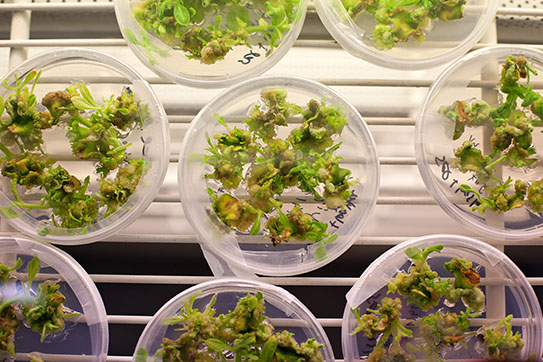With a rapidly expanding human population, urbanisation, poverty and threats from climate change, new innovations are desperately needed to ensure future food security and nutrition requirements in a just and sustainable manner.
Agricultural Biotechnology has the potential to achieve step changes in crop productivity to meet these needs whilst minimising agricultural environmental impacts, but critical questions remain on how the technology is developed and used, and for whom. More generally, agricultural biotechnology is inevitably intertwined with issues of politics, economics, and culture that shape how and if the technology will contribute to global food security, empower marginalised voices and produce transformative change that fosters healthy relations between plants, people and the planet.

This special collection will present the role of natural and social science as ‘honest brokers’ of agricultural biotechnology to help engage, enrich debate, and inform policy.
To achieve this, the special collection will provide a forum for works on both the current and prospective positive and negative impacts of agricultural biotechnology to the environment and society. We encourage articles from across disciplines and around the globe to provide a comprehensive range of views surrounding agricultural biotechnology and its progress. We especially encourage submissions from the Global South.
Key themes of the special collection include:
Current state of agricultural biotechnology
Reviews of the latest agricultural biotechnology methods
Updates from key crop engineering projects
Examples from nature (i.e., horizontal gene transfer)
Increasing (and decreasing) food diversity via genetic modification
Economics of agricultural biotechnology
The relationship between food security and national security
Decolonising agricultural biotechnology
Development vs sustainability goals of biotechnology
Current political climate regarding agricultural biotechnology
Biogeography of attitudes toward agricultural biotechnology across the globe
Updates from researchers who have successfully worked with political systems
The politics of biotechnology, including the recent UK House of Lord’s decision and changing and unchanging opinions within the EU
Ownership and access
Resistances: social and natural
Governing agricultural biotechnology
Public participation and public perceptions of agricultural biotechnology
NGO / civil society perspectives on agricultural biotechnology
Global observatory for genome editing
Novel approaches to governance and assessment
Non-safety assessments
Food security vs. food sovereignty
Ethical and societal engagement
Future of agricultural biotechnology, with particular focus on Africa
Agricultural biotechnology and the future of food in Africa
Representation of African farmers in GMO debates
Please note, special collection articles will be published in regular issues of Plants, People, Planet as they are accepted for publication. Accepted articles will then be compiled to form the special collection, which will be updated at frequent intervals.
We welcome the submission of articles on an ongoing basis. The first iteration of the collection will be composed of articles submitted no later than 15 February 2023. We encourage expressions of interest and abstracts for consideration at any time. Please get in touch with your article ideas at ppp@lancaster.ac.uk.
With best wishes,
Marjorie Lundgren, Amanda Cavanagh, Philip Macnaghten
Guidelines
Plants, People, Planet, published by the not-for-profit New Phytologist Foundation, is an Open Access journal that aims to celebrate everything new, innovative and exciting in plant-focused research that is relevant to society and people’s daily lives.
Articles submitted for consideration in Plants, People, Planet will be subject to peer review and must meet the aims and scope of the journal. Articles should include an engaging 100 word Societal Impact Statement to highlight why the work matters to people, society and the planet.
We can publish alternative language versions of the Societal Impact Statement to enhance the reach and impact of your work. Please include any translated versions of this text, when submitting your work. Please see an example of an alternative language Societal Impact Statement in English, French and Spanish.
Please note, Wiley has arrangements to cover the publication fee for authors based in certain institutions or regions, and there are some waivers and discounts available for special issue authors who lack funds and are not covered by one of these two routes. We do not want lack of funds to be a barrier to contributing to the special collection, so if you have a great article idea, please get in touch and we can discuss options to support you.
Please refer to the full Author Guidelines before submission, which contain information on article types and format, as well as details on how to compile the electronic version of your manuscript. Please contact us if you have questions or a potential manuscript that you would like to discuss.
Submission procedure
Please click the button below to submit your manuscript on ScholarOne Manuscripts (opens in a new tab).
Parts of this page may have been imported from a previous website. If you spot any errors on this page please contact us using the link below.
